Index relies entirely on the support of donors and readers to do its work.
Help us keep amplifying censored voices today.
[vc_row][vc_column][vc_column_text]
A Russian opposition and LGBT rights activist, Ildar Dadin was the first and remains the only, person to be convicted under a notorious 2014 public assembly law. Aimed at punishing anyone who breaks strict rules on protest, the law was enacted to silence dissent after a wave of demonstrations following Putin’s last election victory. Dadin’s crime was to stage a series of one-man pickets, often standing silently with a billboard, attempting to duck the cynical law and push for free expression. For his solo enterprise, Dadin was arrested and sentenced to three years imprisonment in December 2015. In November 2016, website Meduza published a letter smuggled from Dadin to his wife, exposing torture he claimed he was suffering alongside fellow prisoners. The letter, a brave move for a serving prisoner, was widely reported. A government investigation was prompted, and Dadin was transferred – against his will – to an undisclosed new location. A wave of public protest led to Dadin’s new location in a Siberian prison colony being revealed in January 2017. In February 2017, Russia’s constitutional and Supreme Courts suddenly quashed Dadin’s conviction, ruling he should be released and afforded the opportunity for rehabilitation.
Активист, долгое время защищавший права ЛГБТ и оппозиции, Ильдар Дадин стал первым и единственным в России осужденным по принятой в 2014 году статье «Неоднократное нарушение установленного порядка организации либо проведения собрания, митинга, демонстрации, шествия или пикетирования».
Пытаясь обойти этот закон, Дадин провел серию одиночных пикетов против нарушений прав человека, за что был арестован и в 2015 приговорен к трем годам тюрьмы. В ноябре 2016, интернет-издание «Медуза» опубликовало письмо, которое Дадин передал через свою жену. В нем он рассказал о том, как его пытали, и о повсеместности насилия в российских тюрьмах. Публикация его письма – смелый шаг для отбывающего наказание заключенного – имело широкий общественный резонанс, вызвав реакцию со стороны правительства и став основанием для расследования. Дадина, против его воли, перевели из его колонии, после чего он исчез внутри российской пенитенциарной системы. Его местонахождение было раскрыто лишь в январе 2017 после волны общественных протестов. После того как Верховный суд отменил приговор, Ильдар Дадин вышел на свободу из колонии, 26 февраля.
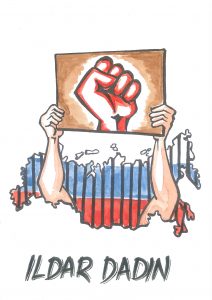
2017 Freedom of Expression Campaigning Award-winning Ildar Dadin was presented an illustration created by cartoonist Aseem Trivedi
Good evening. I am Ildar Dadin, a civil rights activist, writing to you from inside Russia. Unfortunately, I am not allowed to join you in London.
When I first heard I had won an award – from my wife, whilst I was still in a Russian jail – I was glad. Because even though I had been imprisoned, those that wished to silence me had clearly failed.
When I was suddenly released eight weeks ago I began preparing for this trip almost immediately. I wanted to tell the world what I had seen inside Russian jails. But it became clear that the authorities had no intention of letting me join you. When I applied for an international passport, I was told that it could take some time, a very long time. So I may no longer be imprisoned, but Russian security officials want to keep me locked in. They want to try, again, to silence me.
This is a kind of travel ban I now face and I have been clearly told that it is due to my activism.
In 2012, I – like many other brave Russians – took to the streets to protest the dishonest parliamentary and presidential elections. I had been driven to join the demonstrations because I had worked as an observer at the polls and witnessed a large number of voting irregularities. I became convinced that there had been no true elections in Russia. We went through the motions of voting, like an act, but the outcome had already been decided.
Russia’s governmental institutions are a Potemkin put on. Russian police don’t protect citizens. Russian judges don’t adhere to the rule of law. Russian media is not independent and just parrots government propaganda over and over. Russian people – my people – are forced to think only one way, the way the government wants. Our thoughts are the government’s thoughts. Our voices have to follow a script that we are expected to be able to recite on command.
It is like the George Orwell novel Animal Farm. The judges and the police only serve the ruling regime and anyone who speaks their own mind is punished.
Anti-clerics, independent thinkers, the LGBT community: these and any other people who take to the streets and protest, they are punished. Or people who simply write their opinions on Facebook. They are punished. Opposition journalists and politicians aren’t just punished – they are killed. As happened to Natalia Estemirova, Anna Politkovskaya, Boris Nemtsov.
You think, perhaps, this story could not be any worse?
But when I was sent to prison for my activism, I learned about another level in Russia’s horrific dysfunction: torture.
This dehumanising practice debases our nation. It takes us not just back to the time of gulags but deep into the brutal Middle Ages. To “correct” incarcerated Russian citizens, prison staff beat them. They hang them on racks. They pull their legs in different directions as if to quarter them, and break their bones.
This is not speculation. This happened to real people, Russians, in the prison colony where I was imprisoned. I spoke with some of them, others gave their testimony to lawyers that I know. Their injuries and fractures have been documented. There are eyewitnesses to the violence.
This torture also happened to me.
But in every case that I am personally aware of, not one of these sadistic prison guards has been punished. Not one.
Tonight I tell you, that in Russia, there are no human rights. It is a society ruled through levels of cruelty and bigotry where Russians are forced to worship the great leader and any and all dissidents are stoned.
Maybe I cannot join you in London but I can refuse to be silent. And you, friends, can refuse to be silent too. You can refuse to let these people silence me. Together, we can refuse to look away.
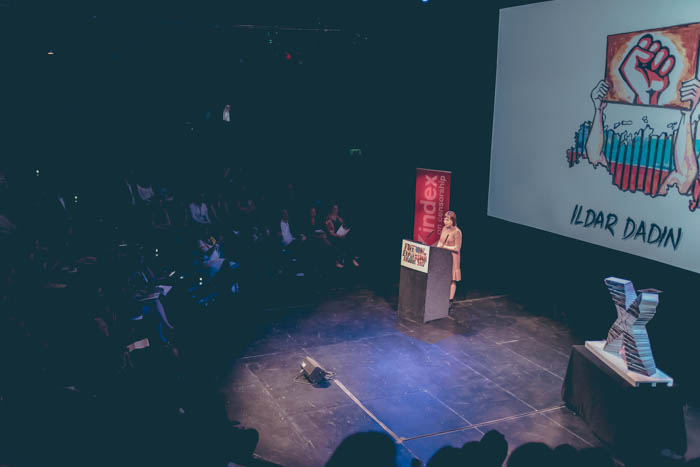
Anastasia Zotova accepted the 2017 Campaigning Award on behalf of her husband Ildar Dadin. (Photo: Elina Kansikas for Index on Censorship)
[/vc_column_text][/vc_column][/vc_row][vc_row][vc_column width=”1/2″][vc_single_image image=”84882″ img_size=”full” alignment=”center”][vc_column_text]
For his one-man protests, Ildar Dadin was sent to prison in December 2015 where he was tortured, before his conviction was quashed in February 2017. Read the full profile.[/vc_column_text][/vc_column][vc_column width=”1/2″][vc_single_image image=”84888″ img_size=”full” alignment=”center”][vc_column_text]
Despite the persecution he faces for his work, Rebel Pepper continues to satirise the Chinese state from a life in exile in Japan. Read the full profile
[/vc_column_text][/vc_column][/vc_row][vc_row][vc_column width=”1/2″][vc_single_image image=”84889″ img_size=”full” alignment=”center”][vc_column_text]
Established in 2015, Turkey Blocks is an independent digital research organisation that monitors internet access restrictions in Turkey. Read the full profile.
[/vc_column_text][/vc_column][vc_column width=”1/2″][vc_single_image image=”84887″ img_size=”full” alignment=”center”][vc_column_text]
Maldives Independent, the Maldives’ premiere English publication and one of the few remaining independent media outlets, was formed in exile in Sri Lanka in 2004. Read the full profile.
[/vc_column_text][/vc_column][/vc_row][vc_row][vc_column][vc_column_text]Добрый вечер. Меня зовут Илья Дадин и я обращаюсь к вам из России. К сожалению, как активисту движения за гражданские права, мне не разрешено быть с вами в Лондоне.
Жена рассказала мне про награду, когда я сидел в российской тюрьме. Я был рад что меня не удалось заглушить, даже если удалось посадить.
После внезапного освобождения восемь недель назад, я сразу начал готовится к этой поездке. Хотелось всему миру рассказать что видел в российских тюрьмах.
Но стало очевидно что власть не собиралась пускать меня к вам. Когда я подавал заявление на загранпаспорт, мне сказали что это может занять много времени. Да. Я не был за решеткой, но я не был свободен. Сотрудники спецслужб снова пытались заткнуть мне рот.
Я не могу выехать из страны и эти ограничения напрямую связаны с моей гражданской деятельностью.
В 2012 году, я, как и многие другие смелые российские граждане, вышел на улицу протестовать против нечестных парламентских и президентских выборов. К участию в акциях меня сподвигла работа наблюдателем на избирательном участке, где я был свидетелем многочисленных нарушений процесса голосования. Я убедился, что настоящих выборов в России не бывает. Мы проходим процесс голосования, но результаты уже решены за нас.
Российские госучреждения это Потемкинские деревни.
Полиция не защищает граждан. Суды не следуют букве закона. Российские СМИ зависимы и просто повторяют за правительственной пропагандой. Русских людей – мой народ – заставляют мыслить односторонне, в угоду власти. Наши мысли – мысли власти. Наши голоса должны повторять текст по команде наизусть.
Живем как в Скотном Двору из Джордж Оруэлла. Судьи и полиция служат правящему режиму, и наказывают любого кто высказывает свое мнение.
Антиклерикалов, независимых мыслителей, ЛГБТ-сообщества и всех кто не согласен и выходит на улицы . Даже тех, которые просто высказывают своё мнение на Фейсбуке. Их тоже наказывают. Оппозиционных журналистов и политиков не просто наказывают – их убивают.Так с Натальей Эстемировой, Анной Политковской, и Борисом Немцовым.
Думаете, что моя история не может быть хуже?
Когда меня посадили в тюрьму за мою гражданскую активность, я я узнал совершенно другой уровень ужасающей дисфункции России: пытки.
Этот античеловечная унижающая практика нашего народа. Это возвращает нас не просто во времена гулагов, а дальше в Средние Века. Чтобы “исправить” заключенных российских граждан,тюремщики избивает их.Подвешивают их на стояках. Тянут им ноги в разные стороны как-будто хотят четвертовать, ломая кости.
Это не придумано. Это происходило с ии реальными русскими людьми, русскими в колонии куда меня посадили. С некоторыми я я разговаривал лично, другие дали показания знакомым адвокатам. Их раны и переломы зафиксированы документально. Они видели насилии своими глазами.
Эти пытки также происходили со мной.
Но в каждом случае, о которых мне известно, ни один из этих садистов-надзирателей не наказан. Ни один.
Сегодня я говорю вам, что в России нет прав человека. Это общество управляетсяу через жестокость и ханжеств, где русских заставляют преклонятся перед великим лидером, а любых диссидентов закидывают камнями
Может я и не могу быть с вами в Лондоне, но я могу отказаться молчать. И вы, друзья, тоже можете отказаться молчать. Вы можете отказать этим людям в позволении заставить меня замолчать. Вместе мы можем отказаться отводить глаза.[/vc_column_text][/vc_column][/vc_row][vc_row][vc_column][vc_basic_grid post_type=”post” max_items=”12″ style=”load-more” items_per_page=”4″ element_width=”6″ grid_id=”vc_gid:1492790037727-479c648e-efcc-4″ taxonomies=”8935″][/vc_column][/vc_row]
[vc_row][vc_column][vc_column_text]
Website Maldives Independent, which provides news in English, is one of the few remaining independent media outlets in a country that ranks 112 out of 180 countries on the Reporters Without Borders Press Freedom Index. In August 2016 the Maldives passed a law criminalising defamation and empowering the state to impose heavy fines and shut down media outlets for “defamatory” content. In September, Maldives Independent’s office was violently attacked and later raided by the police, after the release of an Al Jazeera documentary exposing government corruption that contained interviews with editor Zaheena Rasheed, who had to flee for her safety. Despite the pressure, the outlet continues to hold the government to account.
Thank you very much for this great honour.
We are so humbled and pleased to be here in London with you and very excited about the coming year as Index fellows.
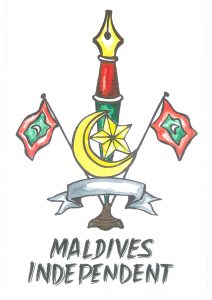
2017 Freedom of Expression Journalism Award-winning Maldives Independent was presented an illustration created by cartoonist Aseem Trivedi.
The day I received Index’s award email was one of my worst days as editor of the Maldives Independent. That was in January – I had already been living in exile for more than six months. Team morale was low: All of us had been arrested and some of us had received death threats. We had faced a police raid on our office. A member of our team, Ahmed Rilwan, had been abducted and disappeared. The space for independent press was narrowing by the day, but public apathy appeared to be growing. We questioned if we were making an impact. And, to make matters worse, there were questions about continued funding for the website. The odds suddenly felt too great to overcome.
And then, we received Index on Censorship’s email.
This award feels like a lifeline.
Most of our challenges remain the same, but this recognition and the fellowship has renewed and strengthened our resolve to continue reporting, especially on the bleakest of days. Most importantly, we no longer feel so alone.
Tonight I want to honour my colleague, Ahmed Rilwan – who embodies the spirit of speaking truth to power, even in the face of the gravest threats. He’s been missing for nearly 1,000 days now. I want to say tonight, that no matter how long it may take, we will continue the search for him and fight for him.
Thank you again to Index on Censorship.
A big thank you to our former editors, for the support and mentorship, and to the Maldives Independent’s brave team, Naish, Hassan, Jundu, Petu, Saya, Shaff and Thy, for your fearless reporting, and to my fellow journalists in the Maldives, for the solidarity. Thank you.
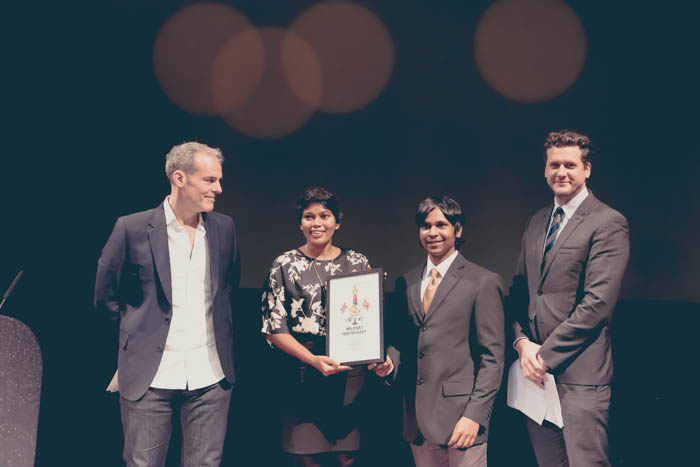
SAGE Publishing’s Ziyad Marar, 2017 Freedom of Expression Award Journalism Fellow Zaheena Rasheed, Maldives Independent’s Ahmed Naish, CNN London bureau chief Tommy Evans (Photo: Elina Kansikas for Index on Censorship)
[/vc_column_text][/vc_column][/vc_row][vc_row][vc_column width=”1/2″][vc_single_image image=”84882″ img_size=”full” alignment=”center”][vc_column_text]
For his one-man protests, Ildar Dadin was sent to prison in December 2015 where he was tortured, before his conviction was quashed in February 2017. Read the full profile.[/vc_column_text][/vc_column][vc_column width=”1/2″][vc_single_image image=”84888″ img_size=”full” alignment=”center”][vc_column_text]
Despite the persecution he faces for his work, Rebel Pepper continues to satirise the Chinese state from a life in exile in Japan. Read the full profile
[/vc_column_text][/vc_column][/vc_row][vc_row][vc_column width=”1/2″][vc_single_image image=”84889″ img_size=”full” alignment=”center”][vc_column_text]
Established in 2015, Turkey Blocks is an independent digital research organisation that monitors internet access restrictions in Turkey. Read the full profile.
[/vc_column_text][/vc_column][vc_column width=”1/2″][vc_single_image image=”84887″ img_size=”full” alignment=”center”][vc_column_text]
Maldives Independent, the Maldives’ premiere English publication and one of the few remaining independent media outlets, was formed in exile in Sri Lanka in 2004. Read the full profile.
[/vc_column_text][/vc_column][/vc_row][vc_row][vc_column][vc_basic_grid post_type=”post” max_items=”12″ style=”load-more” items_per_page=”4″ element_width=”6″ grid_id=”vc_gid:1492790324751-cc80d0b8-3169-3″ taxonomies=”8935″][/vc_column][/vc_row]
[vc_row][vc_column][vc_column_text]

2017 Freedom of Expression Arts Award-winning Rebel Pepper was presented an illustration created by cartoonist Aseem Trivedi
Wang Liming, better known under the pseudonym Rebel Pepper, is one of China’s most notorious political cartoonists. For satirising Chinese Premier Xi Jinping and lampooning the ruling Communist Party, Rebel Pepper has been repeatedly persecuted. In 2014, he was forced to remain in Japan, where he was on holiday, after serious threats against him were posted on government-sanctioned forums. The Chinese state has since disconnected him from his fan base by repeatedly deleting his social media accounts, he alleges his conversations with friends and family are under state surveillance, and self-imposed exile has made him isolated, bringing significant financial struggles. Nonetheless, Rebel Pepper keeps drawing, ferociously criticising the Chinese regime.
笔名为“变态辣椒” 的王立铭是一位来自中国大陆的漫画家,以其反共讽刺性漫画而闻名。他因为讥讽习近平以及中国共产党而一而再再而三地受政府迫害。2014年5月,王立铭在旅游日本期间因在中国大陆官媒《人民网》受威胁儿被迫居留日本。中国大陆因想断绝王立铭与其粉丝的关系而删除他社交媒体的账号。他声称与亲戚朋友的交谈总是被监视。他也因为长期独自流亡国外而渐渐地与世隔绝, 陷入经济困境。然而,他并没有放弃以他讽刺性的漫画讥讽共产党。
Hello everybody, my name is Wang Liming and I am a Chinese political cartoonist who is currently living in exile in Japan. I am also known as “Rebel Pepper”. I am very grateful for the recognition of my works and am very honoured to receive this award. Unfortunately, I am unable to personally attend the awards ceremony and the other activities Index on Censorship has in store as there were some issues with my visa.
China has little to no freedom of speech and its people are constantly living in fear under this totalitarian regime. The Chinese Communist Party often portray the Chinese administration as being honourable and righteous and delude the people into believing in this false portrayal.
Political cartoons are significant as I can use my works to peel away the mask of false perfection put on by the Chinese government. The humour and satire employed in my works can also help lighten the mood and dispel the fear that the Chinese people have towards the administration. I feel that these are the key reasons why political cartoons play such an important role in China.
Ever since I came to Japan, I have been able to relish freedom of speech to the fullest. As such, my works are no longer limited by any external restrictions save for the boundaries of my own imagination.
I would like to especially thank my wife as I would not have been able to persevere to this day had it not been for her unending support and understanding. I would also like to extend my gratitude to my Chinese friends and comrades who sympathise with my struggles and understand why I do what I do. I would also like to thank my Japanese friends who have given me plenty of opportunities to create and publish my works.
I will continue working hard on creating new cartoons – this is the least I can do towards democratising China. Thank you everyone![/vc_column_text][/vc_column][/vc_row][vc_row][vc_column width=”1/2″][vc_single_image image=”84882″ img_size=”full” alignment=”center”][vc_column_text]
For his one-man protests, Ildar Dadin was sent to prison in December 2015 where he was tortured, before his conviction was quashed in February 2017. Read the full profile.[/vc_column_text][/vc_column][vc_column width=”1/2″][vc_single_image image=”84888″ img_size=”full” alignment=”center”][vc_column_text]
Despite the persecution he faces for his work, Rebel Pepper continues to satirise the Chinese state from a life in exile in Japan. Read the full profile
[/vc_column_text][/vc_column][/vc_row][vc_row][vc_column width=”1/2″][vc_single_image image=”84889″ img_size=”full” alignment=”center”][vc_column_text]
Established in 2015, Turkey Blocks is an independent digital research organisation that monitors internet access restrictions in Turkey. Read the full profile.
[/vc_column_text][/vc_column][vc_column width=”1/2″][vc_single_image image=”84887″ img_size=”full” alignment=”center”][vc_column_text]
Maldives Independent, the Maldives’ premiere English publication and one of the few remaining independent media outlets, was formed in exile in Sri Lanka in 2004. Read the full profile.
[/vc_column_text][/vc_column][/vc_row][vc_row][vc_column][vc_column_text]大家好,现场的朋友好,我叫王立铭,是来自中国流亡日本的政治漫画家,我的笔名叫Rebel Pepper。非常感谢评委对我作品的肯定,很荣幸能获得这个奖项,由于我的签证出了一些状况,不能亲自来参加颁奖仪式和一系列的活动,非常可惜。中国是一个没有言论自由的国家,人民长期生活在极权的恐惧之下。中共独裁统治者倾向于把自己塑造成伟大、光荣、正确的虚假的完美形象,政治漫画的意义就变得非常重大,我可以用画笔去揭穿他们虚假的面具,让人们在嘲笑和讽刺的氛围里去消解对极权的恐惧,我觉得这是政治漫画在中国最大的意义。我来到日本之后,享受了充分的言论自由,我的创作不再有任何局限,想象力的边界就是我创作的极限。在这里我要特别感谢的我的太太,是她的支持和理解我才坚持到今天。我还要感谢中国和全世界各地的华人朋友,他们非常同情我的遭遇,理解我创作的想法,我也要感谢日本的朋友们,他们给我提供了很多创作和出版的机会。接下来我还会继续努力创作下去,为中国的民主化进程贡献出我自己的力量。谢谢大家![/vc_column_text][/vc_column][/vc_row][vc_row][vc_column][vc_basic_grid post_type=”post” max_items=”12″ style=”load-more” items_per_page=”4″ element_width=”6″ grid_id=”vc_gid:1492781347492-f15d4057-ba13-0″ taxonomies=”8935″][/vc_column][/vc_row]
[vc_row][vc_column][vc_column_text]
In a country marked by increasing authoritarianism, a strident crackdown on press and social media as well as numerous human rights violations, Turkish-British technologist Alp Toker brought together a small team to investigate internet restrictions. Using Raspberry Pi technology they built an open source tool able to reliably monitor and report both internet shut downs and power blackouts in real time. Using their tool, Turkey Blocks have since broken news of 14 mass-censorship incidents during several politically significant events in 2016. The tool has proved so successful that it has been implemented elsewhere globally.
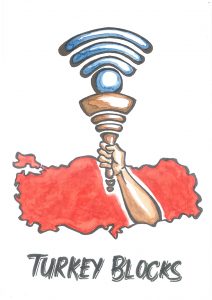
2017 Freedom of Expression Digital Activism Award-winning Turkey Blocks was presented an illustration created by cartoonist Aseem Trivedi
Internet shutdowns – the wholesale censorship of millions of voices and silencing of entire populations – pose a grave threat to the media, democracy, most of all vulnerable communities and ordinary citizens. Since the invention of the world wide web we have come to rely on the internet for personal communication, news gathering, publishing and almost every aspect of our lives. That reliance has introduced a single point of failure which is now being exploited by authorities who seek to control narrative and restrict the flow of information on an unprecedented scale.
In 2015, I was in Ankara when so-called Islamic State launched a deadly terror attack, killing over a hundred people at a rally. In the hours that followed the authorities restricted access to social media and communication networks; victims were unable to contact their loved ones or reach out for help. Journalists were unable to contact eyewitnesses or ask critical questions so essential in a healthy democracy.
Our mission was born: Since then my organisation Turkey Blocks has developed new technology that can pinpoint and validate reports of shutdowns in real time. Through 2016 we uncovered evidence of over a dozen major blackouts during national emergencies, arrests of opposition party members and a devastating attempted military coup. We provided the data that enabled media, local press and international communities to report with confidence and push back to keep the internet on. We encouraged the government to become more transparent and limit use of their telecommunications kill-switch. Today our cause crosses political lines and resounds throughout Turkey’s polarised society.
Online censorship is increasingly used to mask more severe human rights violations – not just in Turkey, but from China, Vietnam, Pakistan, India, Kashmir, to Cameroon and Bahrain and all over the world. My team’s mission now extends beyond Turkey to cover several other countries as part of our NetBlocks observatory project. With new allies like Access Now and Index’s own Mapping Media Freedom project, standing alongside the global Open Source and open technology communities we send a unified message to those who seek to silence independent voices: as long as freedom of expression and digital rights are not safeguarded, our mission will continue and we will persist.
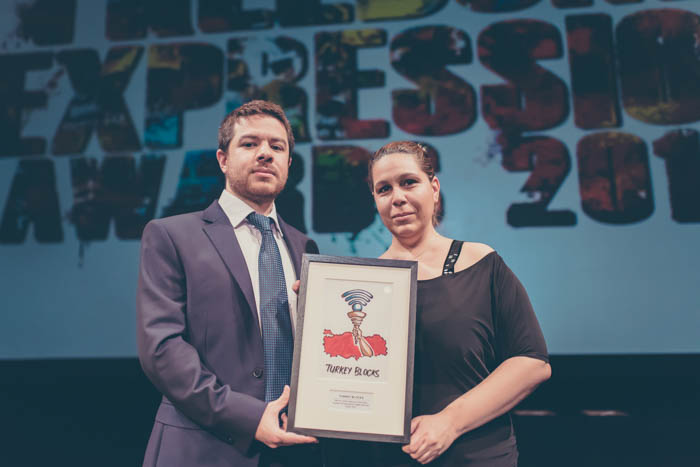
Alp Toker and Isik Mater of Digital Activism Award-winning Turkey Blocks at the 2017 Freedom of Expression Awards (Photo: Elina Kansikas for Index on Censorship)
[/vc_column_text][/vc_column][/vc_row][vc_row][vc_column width=”1/2″][vc_single_image image=”84882″ img_size=”full” alignment=”center”][vc_column_text]
For his one-man protests, Ildar Dadin was sent to prison in December 2015 where he was tortured, before his conviction was quashed in February 2017. Read the full profile.[/vc_column_text][/vc_column][vc_column width=”1/2″][vc_single_image image=”84888″ img_size=”full” alignment=”center”][vc_column_text]
Despite the persecution he faces for his work, Rebel Pepper continues to satirise the Chinese state from a life in exile in Japan. Read the full profile
[/vc_column_text][/vc_column][/vc_row][vc_row][vc_column width=”1/2″][vc_single_image image=”84889″ img_size=”full” alignment=”center”][vc_column_text]
Established in 2015, Turkey Blocks is an independent digital research organisation that monitors internet access restrictions in Turkey. Read the full profile.
[/vc_column_text][/vc_column][vc_column width=”1/2″][vc_single_image image=”84887″ img_size=”full” alignment=”center”][vc_column_text]
Maldives Independent, the Maldives’ premiere English publication and one of the few remaining independent media outlets, was formed in exile in Sri Lanka in 2004. Read the full profile.
[/vc_column_text][/vc_column][/vc_row][vc_row][vc_column][vc_column_text]Milyonlarca sesi toptan susturan internet kesintileri, medya ve demokrasinin etkili çalışmasını engelliyor ve en önemlisi, savunmasız toplulukların ve vatandaşların hayatını zorlaştırıyor. İcat edilmesinden bu yana, kişisel iletişim, haber alma, yayınlama gibi pek çok yönden internete bel bağlamış durumdayız. İnternetin yaşantımızda bu kadar büyük bir yer kaplaması, erişimin kısıtlanması durumunda büyük boşluk yaratıyor.
IŞİD’in Ekim 2015’te Ankara Garı yakınlarında düzenlenen miting sırasında gerçekleştirerek yüzlerce kişinin ölümüne sebep olduğu, Türkiye tarihinin en ölümcül terör saldırısı sırasında ben de Ankara’daydım. Saldırının hemen akabinde yetkililer sosyal medyaya ve iletişim ağlarına erişimi kısıtladılar; o sırada mitingde bulunanlar ailelerine ulaşıp “ben iyiyim” diyemediler, yaralı olanlar için yardım isteyemediler. Gazeteciler, her sağlıklı demokraside olması gereken bilgiye ulaşma özgürlüğünden mahrum bırakıldılar. Görgü tanıklarıyla iletişime geçip, olaylarla ilgili ayrıntıları öğrenemedikleri için konuyla ilgili haber yapmakta zorlandılar.
Görevimiz artık belliydi. O günden itibaren Turkey Blocks organizasyonu olarak, internet engellemelerini gerçek zamanlı olarak saptayabilen ve doğrulayabilen yeni bir teknoloji geliştirdik. 2016 yılı süresince, ulusal krizler, muhalefet partisi üyelerinin tutuklanması ve askeri darbe girişimi gibi olaylar sırasında ülke çapında ondan fazla kesintiye dair bulgular elde ettik. Elde ettiğimiz veriler, medya, yerel basın ve uluslararası organizasyonların internet kullanıcılarına doğru ve ayrıntılı bilgi vermelerini ve kullanıcıların internet kesintilerine karşı durabilmelerini sağladı. Hükümeti daha şeffaf olmaya ve internet kesintilerini en aza indirgemesini teşvik ettik. Girişimimiz bugün siyasi sınırları aşarak, ayrım gözetmeksizin tüm Türkiye’ye bilgi sağlıyor.
Dijital sansür, sadece Türkiye’de değil. Çin, Vietnam, Pakistan, Hindistan, Keşmir, Kamerun ve Bahreyn gibi dünyanın birçok ülkesinde meydana gelen ve gittikçe ciddileşen insan hakları ihlallerini gizlemek için giderek daha çok kullanılmakta. Ekibimizin yeni misyonu, NetBlocks gözlemleme projesi dahilinde, Türkiye dışındaki diğer ülkelere de ulaşmak. Access Now ve Index on Censorship’in Mapping Media Freedom Projesi gibi müttefiklerle birlikte küresel Açık Kaynak, Özgür Yazılım ve açık teknoloji topluluklarının yanında yer alarak, bağımsız sesleri susturmak isteyenlere ortak mesajımızı gönderiyoruz: Misyonumuz, ifade özgürlüğü ve dijital haklarımız korunmadığı sürece var olacak ve yolumuza devam edeceğiz.[/vc_column_text][/vc_column][/vc_row][vc_row][vc_column][vc_basic_grid post_type=”post” max_items=”12″ style=”load-more” items_per_page=”4″ element_width=”6″ grid_id=”vc_gid:1492791622630-bd3f02e6-28e4-6″ taxonomies=”8935″][/vc_column][/vc_row]